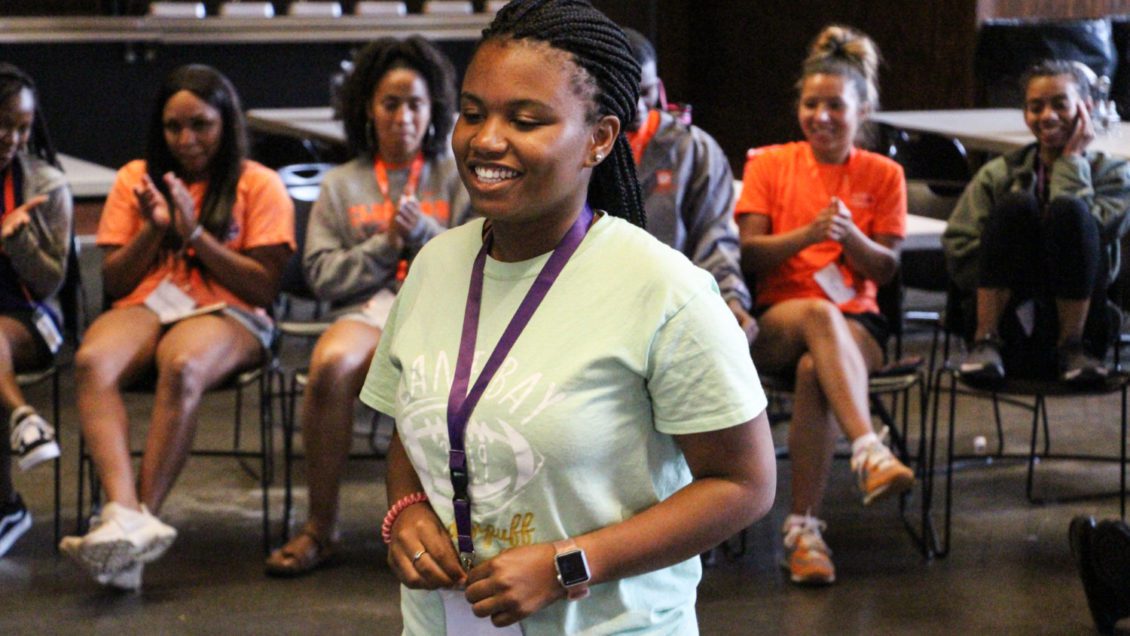Shortly after Chris Miller was appointed interim vice president for Clemson University Student Affairs, one of his first tasks was to reinvigorate the division’s approach to inclusive excellence. To create an organizational structure capable of providing optimal support for student success and achievement, Miller knew advocacy for underrepresented and underserved communities had to be a central tenet of the division.
He unveiled for the first time a new conceptual structure for Student Affairs during a Board of Trustees meeting in February 2020. In the months that have followed, what emerged is a department now known as Community Achievement and Student Empowerment (CASE).

“We have been deliberate and thoughtful in our efforts to serve Clemson students,” said Miller, who also holds the dean of students role. “We are embracing diversity of thought and practice through this new area and it will be a place to grow ideas and foster community.”
DeOnte Brown — who previously led the Office of Student Transitions and Family Programs as an interim — was named assistant dean of students and CASE’s director. Earlier this year, Brown was one of 10 professionals nationally to be named an Outstanding First-Year Student Advocate by the National Resource Center and Cengage. He has coordinated Clemson’s new student retention programs for several years.
Brown said he was given a blank slate to create a vision for the department that embodies inclusive excellence, one of four core values weaved into the Student Affairs strategic plan.
“We have a role in the University’s inclusive excellence priority,” he said. “There’s a true commitment within our department to see how we can move beyond what Clemson has traditionally defined as underrepresented students. We are looking at historically underserved populations in higher education.”
In addition to students of color, CASE looks to extend support for students who identify as first-generation, international, military-connected and veterans.

Under the direct supervision of Senior Associate Dean of Students Kimberly Poole, Brown assembled a leadership team that included Brennan Beck, director of Military and Veteran Engagement, and Sarah Dumas, assistant director for enrichment programs. Together, they went to work devising the department’s educational imperative, mission statement, values and goals.
CASE’s educational imperative states, “Every student should have the opportunity to succeed in higher education. We recognize systemic barriers exist that commonly prevent some students from achieving their academic, personal and professional goals.”
The CASE team established four critical values to its work in relationships, equity, accountability and leadership. Further, the group identified three goals for the department as it heads into its first academic year of operation:
- Advocate for individual and collective student needs
- Connect students to intentional opportunities and resources
- Empower students’ transition into and beyond with purposeful programming
“It was a team effort to determine what these components of the office look like, and we feel they’re reflective of who we are as individuals,” Brown said. “We each bring something unique to the table, so we look forward to building on the synergies we have in our work.”

Beck previously worked alongside Brown and Dumas before branching off into his own area to support student veterans and military-connected students. While the move made sense as the Student Veteran Center expanded to a new space in Vickery Hall, he said it was difficult to wear multiple hats and perform to the best of his ability.
With well over 300 verified student veterans and even more military-connected students on campus, their needs are unique. Nearly half are married. One in four have children. And many have full- or part-time jobs, in addition to their schoolwork.
“It got to a point where I was responsible for administrative functions, meetings and programming, all while trying to be intentional and accessible for students,” he said. “I honestly felt like I was stretched to two or three different roles. I was very confident this was the right move for Military and Veteran Engagement. I’m inspired to be back on a great team working toward a common goal.”
Dumas has worked closely with student retention programs since 2017. Among them are valuable peer engagement programs for students of color, such as CONNECTIONS and Sister 2 Sister. Last fall, the CONNECTIONS program welcomed its largest cohort of mentees in Clemson history.

While she doesn’t expect the intentionality of programs to change, Dumas said the focus is on developing a more holistic approach for a broader group of underserved populations.
“As students come into the University, we support their transition into, through and beyond Clemson,” she said. “Our students come with a wealth of different experiences, backgrounds and identities. How are we challenging them to grow and develop and seek out resources while they’re here? That’s the core of our work. If you identify as first-gen or international, we want you to be able to tune into our workshops or access resources. I look at it as an expansion of what we do.”
The next steps for CASE are to continue working with academic colleges and other key partners across campus, such as the Gantt Multicultural Center. The department is working on developing a new web and social media presence. The summer Orientation period will be critical to getting the word out to incoming freshmen and transfer students as well.
CASE leaders are confident the new focus will cultivate and challenge creativity. As Beck puts it, “It’s developing uniquely… it’s not cut and paste.” Ultimately, though, Brown hopes this new department will be a destination for students looking for myriad ways to be connected to the Clemson experience.
“I’m excited to collaborate with students who are looking for ways to get further involved,” he said. “Campus should see a more direct call to students to come in and create experiences their peers can benefit from.”
Get in touch and we will connect you with the author or another expert.
Or email us at news@clemson.edu

